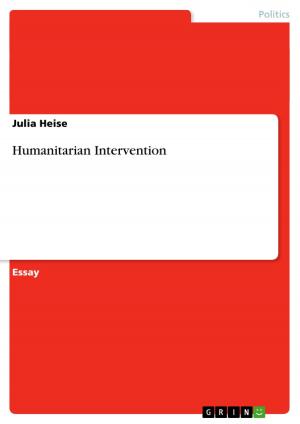Good and bad practice in participatory research
'The best of both worlds: representativeness and insight?'
Nonfiction, Social & Cultural Studies, Social Science| Author: | Cynthia Dittmar | ISBN: | 9783640378227 |
| Publisher: | GRIN Publishing | Publication: | July 20, 2009 |
| Imprint: | GRIN Publishing | Language: | English |
| Author: | Cynthia Dittmar |
| ISBN: | 9783640378227 |
| Publisher: | GRIN Publishing |
| Publication: | July 20, 2009 |
| Imprint: | GRIN Publishing |
| Language: | English |
Seminar paper from the year 2008 in the subject Politics - International Politics - Topic: Development Politics, grade: distinction, University of Manchester (Institute for Development Policy and Management), course: Development Research, language: English, abstract: Development research serves different purposes - from informing policy-making on a macro level, to conducting large scale poverty assessments of countries and regions, and planning, managing, evaluating and impact assessment of development projects and programs. Since the 1970s, participatory research methods have become increasingly important in this field. Whereas initially they were used to inform project practice on the micro-level, they are now also used to inform policy making and enhance governance. 'They moved from the margins of development practice to the very heart of development mainstream' (Mikkelsen 2005: 58). Participatory research can be seen as the methodological basis of participatory development. However, there is ongoing debate on whom those methods inform - the instrumental practice of aid/ governmental agencies ('participation as means') or the local communities themselves, providing them with the means to conduct their development ('participation as end'). This ambiguity is the main reason why a coherent definition of participatory development and research does not exist. The notion 'participatory' is blurred and definitions differ widely. Common to most definitions is the view that an active involvement of stakeholders will enhance development research and projects. An important advantage of participatory research is seen in the deeper insight into local life and needs. Chapter 2 of this paper will outline the different aspects of the concept and will discuss good and bad practices in participatory research, paying particular attention to the conflict between participation as means and as end. The wider scope of current participatory research led to the need for valid and robust data gathered through participative research methods which raises the question for the representat¬iveness of participatory gathered data. Chambers claims that participatory research can provide the 'best of both worlds' (2001: 25) - as it meets the requirements of deeper holistic insight represented by qualitative research and representativeness, represented by quantitative approaches. In Chapter 3 the scope of qualitative and quantitative approaches and to which extent Chambers claim is cogent will be discussed. Having analysed participation from those different analytical perspectives, this paper will argue that participation is a contested field and cannot meet expectations from all competing interests. [...]
Seminar paper from the year 2008 in the subject Politics - International Politics - Topic: Development Politics, grade: distinction, University of Manchester (Institute for Development Policy and Management), course: Development Research, language: English, abstract: Development research serves different purposes - from informing policy-making on a macro level, to conducting large scale poverty assessments of countries and regions, and planning, managing, evaluating and impact assessment of development projects and programs. Since the 1970s, participatory research methods have become increasingly important in this field. Whereas initially they were used to inform project practice on the micro-level, they are now also used to inform policy making and enhance governance. 'They moved from the margins of development practice to the very heart of development mainstream' (Mikkelsen 2005: 58). Participatory research can be seen as the methodological basis of participatory development. However, there is ongoing debate on whom those methods inform - the instrumental practice of aid/ governmental agencies ('participation as means') or the local communities themselves, providing them with the means to conduct their development ('participation as end'). This ambiguity is the main reason why a coherent definition of participatory development and research does not exist. The notion 'participatory' is blurred and definitions differ widely. Common to most definitions is the view that an active involvement of stakeholders will enhance development research and projects. An important advantage of participatory research is seen in the deeper insight into local life and needs. Chapter 2 of this paper will outline the different aspects of the concept and will discuss good and bad practices in participatory research, paying particular attention to the conflict between participation as means and as end. The wider scope of current participatory research led to the need for valid and robust data gathered through participative research methods which raises the question for the representat¬iveness of participatory gathered data. Chambers claims that participatory research can provide the 'best of both worlds' (2001: 25) - as it meets the requirements of deeper holistic insight represented by qualitative research and representativeness, represented by quantitative approaches. In Chapter 3 the scope of qualitative and quantitative approaches and to which extent Chambers claim is cogent will be discussed. Having analysed participation from those different analytical perspectives, this paper will argue that participation is a contested field and cannot meet expectations from all competing interests. [...]















